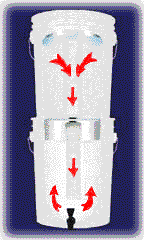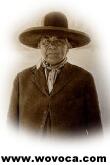MOTHER SHIPTON PROPHESIES
From The House
of David Teaching Centre
SOURCE: CompuServe Encounters Forum as posted on 12/11/95 by Kent Lawrence,
71621,2534--Section Leader of Earth Changes/Prophesy Library.
This rare collection of "Mother Shipton's Prophecies" was sent to "Nexus"
by a reader who told us that, 30 years ago, she painstakingly transcribed
them and managed to smuggle them out of the Mitchell Library in Sydney, now
the State Library of New South Wales. The originals were kept in a locked
room, along with many other volumes of prophetic writings deemed unsuitable
for viewing by the general public.
Mother Shipton was born Ursula Sontheil in 1488 in Norfolk, England, and
died in 1561. She exhibited prophetic and psychic abilities from an early
age. At 24, she married to Toby Shipton and eventually became known as Mother
Shipton [See Footnote for more about her History]. Many of her visions came
true within her own lifetime and in subsequent centuries. These rare verses
seem to have prophetic indications for our times, but are, of course, open
to interpretation.
"A carriage without horse will go, disaster fill the world with woe. In London,
Primrose Hill shall be in center hold a bishops sea. Around the world men's
thoughts will fly, quick as the twinkling of an eye. And water shall great
wonders do, How strange, and yet it shall come true.
Through towering hills proud men shall ride, no horse or ass move by his
side. Beneath the water, men shall walk, shall ride, shall sleep, shall even
talk. And in the air men shall be seen, In white and black and even green.
A great man, shall come and go for prophecy declares it so.
In water, iron then shall float as easy as a wooden boat. Gold shall be seen
in stream and stone, In land that is yet unknown. And England shall admit
a Jew, Do you think this strange, but it is true. The Jew that once was led
in scorn, shall of a christian then be born.
A house of glass shall come to pass, In England. But alas, alas, a war will
follow with the work where dwells the pagan and the turk. These states will
lock in fiercest strife, and seek to take each other's life. When north shall
thus divide the south an eagle build in lion's mouth then tax and blood and
cruel war shall come to every humble door.
Three times shall lovely sunny France be led to play a bloody dance. Before
the people shall be free three tyrant rulers shall she see. Three rulers
in succession be each springs from different dynasty. Then when the fiercest
strife is done. England and France shall be as one. The British olive shall
next then twine, in marriage with a German vine. Men walk beneath and over
streams fulfilled shall be their wondrous dreams.
For in those wondrous far off days, the women shall adopt a craze to dress
like men, and trousers wear and to cut off their locks of hair. They'll ride
astride with brazen brow, as witches do on broomsticks now. And roaring monsters
with men atop, does seem to eat the verdant crop.
And men shall fly as birds do now, and give away the horse and plow.
They'll be a sign for all to see be sure that it will certain be. Then love
shall die and marriage cease and nations wane as babes decrease. And wives
shall fondle cats and dogs and men live much the same as hogs.
ON THE OUTER WRAPPINGS OF THE SCROLLS
I know I go, I know I'm free, I know that this will come to be, Secreted
this, for this will be found by later dynasty. A dairy maid, a bonnie lass,
shall kick this tome as she does pass And five generations she shall breed
before one male child does learn to read.
This is then held year by year, till an iron monster trembling fear, eats
parchment, words and quill and ink, and mankind is given time to think. And
only when this comes to be will mankind read this prophecy. But one man sweets
another's bain so I shall not have burned in vein.
FOUND ON A SCROLL IN ANOTHER JAR
The signs will be there for all to read; when man shall do most heinous deed
man will ruin kinder lives; by taking them as to their wives. And murder
foul and brutal deed: when man will only think of greed. and man shall walk
as if asleep; he does not look - he may not peep And iron men the tail shall
do; and iron cart and carriage too.
The king shall false promise make; and talk just for talking's sake. And
nations plan horrific war; the like as never seen before. and taxes rise
and lively down; and nations wear perpetual frown. yet greater sign there
be to see; as man nears latter century. three sleeping mountains gather breath,
and spew out mud, ice and death. an earthquake swallow town and town; in
lands as yet to me unknown And Christian one fights Christian two and nations
sigh, yet nothing do. And yellow men great power gain; from mighty bear with
whom they've lain.
These mighty tyrants will fail to do, they fail to split the world in two.
But from their acts a danger bred; an ague, leaving many dead. And physics
find no remedy; for this is worse than leprosy. Oh many signs for all to
see; the truth of this true prophecy.
THE LAST PROPHECY
In nineteen hundred and twenty-six build houses light of straw and sticks.
For then shall mighty wars be planned and fire and swords shall sweep the
land. When pictures seem alive with movements free, when boats like fishes
swim beneath the sea. When men like birds shall scour
the sky. Then half the world, deep drenched in blood shall die. For those
who live the century through in fear and trembling this shall do. Flee to
the mountains and the dens to bog and forest and wild fens.
For storms will rage and oceans roar when Gabriel stands on sea and shore,
and as he blows his wondrous horn old worlds die and new be born. A fiery
dragon will cross the sky six times before the earth shall die. Mankind will
tremble and frightened be for the six heralds in this
prophecy.
For seven days and seven nights man will watch this awesome sight. The tides
will rise beyond their ken. To bite away the shores and then the mountains
will begin to roar and earthquakes split the plain to shore. And flooding
waters rushing in, will flood the lands with such a din that
mankind cowers in muddy fen and snarls about his fellow men.
He bares his teeth and fights and kills and secrets food in secret hill and
ugly in his fear, he lies to kill marauders, thieves and spies. Man flees
in terror from the floods and kills, and rapes and lies in blood and spilling
blood by mankind's hand will stain and bitter many lands.
And when the dragon's tail is gone man forgets and smiles and carries on.
To apply himself - too late, too late for mankind has earned deserved fate.
His masked smile, his false grandeur, will serve the gods their anger stir
and they will send the dragon back to light the sky--his tail
will crack. Upon the earth and rend the earth and man shall flee, king, lord
and serf.
But slowly they are routed out to seek diminishing water spout and men will
die of thirst before the oceans rise to mount to the shore. And lands will
crack and rend anew do you think it strange, it will come true. And in some
far--off distant land some men--oh such a tiny band will have to
leave their solid mount and span the earth, those few to count.
Who survives this (unreadable) and then begin the human race again. But not
on land already there, but on ocean beds, stark, dry and bare. Not every
soul on earth will die, as the dragon's tail goes sweeping by, not every
land on earth will sink, but these will wallow in stench and stink,
of rotting bodies of beast and man, of vegetation crisped on land.
But the land that rises from the sea will be dry and clean and soft and free.
Of mankinds dirt and therefore be, the source of man's new dynasty. and those
that live will ever fear the dragon's tail for many year but time erases
memory You think it strange. but it will be.
And before the race is built anew, a silver serpent comes to view and spew
out men of like unknown to mingle with the earth now grown cold from its
heat and these men can enlighten the minds of future man to intermingle and
show them how to live and love and thus endow. the
children with the second sight. a natural thing so that they might grow graceful,
humble and when they do the golden age will start anew.
The dragon's tail is but a sign for mankind's fall and man's decline. and
before this prophecy is done I shall be burned at the stake, at l My body
singed and my soul set free You think I utter blasphemy you're wrong. These
things have come to me this prophecy will come to be.
FOOTNOTE: More About Mother Shipton
Source: Selections from the Chapter 'The Devil's Own' in 'Fire Burn' by Ken
Radford
It is recorded that during the reign of Henry VII 'in the year of our Lord
fourteen hundred eighty and six', there lived in the village of Knaresborough
among the Yorkshire moors an orphaned girl who was barely sixteen years old.
She is remembered as Agatha Southeil.
Agatha was a dreamer who roamed among the whins and fells, with nothing but
paltry relief from the parish and the food she begged to keep her from starvation
and a pauper's grave.
One evening, as she wandered beyond her shack on the moors, she came upon
a stranger who was dressed in the cloak and hat as worn by a gentleman. She
had not noticed him approach along the path, perhaps because her eyes were
lowered as she sat for a shile upon a rock weeping quietly, wondering whether
once more she would go hungry to her bed.
Seeing her alone and troubled, the stranger cam close. Why should one so
young and attractive be sad, he wondered. He bent down, brushing a tear from
her cheek. His touch was as cold as a churchyard tomb. And when she looked
up with a start his eyes held her spellbound in their fiery gaze. She was
not to know that is was the Prince of Darkness, the Devil himself, who hid
behind the guise of a handsome young man.
'Dry your tears,' said the stranger, and promised that if she were to put
her trust in him her fortune would change. There would be no more poverty
and despair, and riches would be her reward.
(For a long time he stayed with her, charming her, then vanished as mysteriously
as he came. She wondered if it had all been a dream, but in the morning found
coins of copper and gold he left for her.)
In the days that followed, the Devil came many times to visit Agatha, aways
in the guise of a young gentleman with a winsome smile and somniferous eyes.
His charm and charisma won her affection, and presently he became her first
love, arousing unknown passion in her heart. Once he came to her miserable
dwelling and carried her off on a stallion as black and swift as a storm
cloud. Far away they rode, over hills and dales with a thundering of hoofs
and the rushing of wind, until a magnificent house came in sight, its windows
all aglow. Servants prepared a feast for their master and his guest. There
was wine and music and splendour such as Agatha had never imagined. The world
lay at her feet, she was promised, now that she was the Devil's lover. Only
he could ransack earth's treasures, stir thunder and lightning, and lavish
upon her powers beyond her dreams, with which she could trouble and maim
whomever she pleased, plague young and old with fearful nightmares and unveil
what lay in the future as readily as she remembered events of the past.
When the feasting was over and Agatha's thoughts reeled with wine and promises
of fortune to come, the lamps were dimmed. At the Devil's invitation she
recited the words of some strange incantation. Whereupon the vaulted roof
of heaven swirled and rumbled. The house and all around her vanished as she
seemed to tumble through a pool of darkness until she awakened, bewildered,
to find herself wandering the moors in the moonlight near her shack.
Thereafter, a wild glint showed in Agatha's eyes. Her face was pale and drawn,
with none of the freshness of her youth.
(The fearful villages came to believe she was bewitched and Agatha took revenge
on all who came to taunt her).
Accounts of the young witch's mischief were brought to the attention of the
Justices who dispatched their stoutest bailiffs to apprehend her. Undaunted
by the squawking of crows and the hissing of serpents that stood vigil at
the door, they went inside and dragged her away.
During her inquisition and medical examination it was discovered that Agatha
was with child. But the father of her baby was not mortal whit, she protested.
He was a prince whose mastery knew no bounds, who held dominion over man
and beast and breathed fear into their hearts.
Concluding that she was just an ignorant wench, mentally and emotionally
unstable and easily seduced, the Justices paid no attention to such hysterical
rambling and set her free - a compassionate verdict at a time when heresy
was so cruelly punished.
But the villagers were less indulgent, continuing to persecute the girl
mercilessly. Tormented by dogs and stones and bitter tongues, she was at
last driven from her shack and forced to seek shelter on the moors.
the span of forty weeks expired, and the birth of her child spelled the end
of Agatha Southeil's miserable life, barely had she reached the age of seventeen.
It is said that her death was attended by a howling wind which drowned the
screams that echoed in the cavern where she lay.
Close to her body they discovered a newborn female of grotesque shape. Its
head was disproportionately large, with goggling eyes that burned like fire.
Its cheeks were shrunken, and the mouth bore a clearly defined impression
of teeth, with the upper canines protruding like the tusks of a young wild
boar. Misshapen limbs joined the body as though screwed together piece by
piece. Those who found the child turned their eyes in revulsion.
With no mother to watch over it, the foundling became a ward of the parish
and was placed in the care of a kindly woman who gave it the name Ursula.
a stranger child she had never known. It ate greedily and slept for only
a few house each day, lying awake through the night to stare into the darkness.
She told how, sometimes when the night was calm, curtains stirred, doors
slammed, and shutters swung wildly on the hinges. Once, when the infant was
left lying in its crib, the woman returned to find her home ransacked. Windows
were shattered, burning embers were strewn in the hearth, furniture was broken
and upturned. Distressed, she ran to her neighbours who were afraid to cross
the threshold, repelled by a fierce hissing and wailing as though wild cats
were crouching behind the door waiting to spring at them.
Anxious for the safety of the child, the foster mother ventured inside. But
the infant Ursula was nowhere to be seen. 'Some evil goblin has spirited
the baby away!' she cried.
Every nook and cranny was searched, until the infant and crib were found
wedged in the chimney.
As Ursula grew, so did her deformity and unnatural temper. She bitterly resented
reproach and bared her teeth menacingly whenever she was chastized. It seemed
that never a day went by when she was not attended by her father, the Devil,
who lurked about the home of her guardian, appearing sometimes as a large
dog with baleful eyes; other times making his presence felt with a cacophony
of weird sounds and fearful happenings. The walls and floor would tremble
and pulsate like heartbeats growing louder. The food on their plates would
turn to mould. Crockery was flung about the room as though by a raging
poltergeist. Invisible hands clawed and scratched at the foster mother, tearing
her clothes from her back and laying icy fingers upon her flesh.
But always the bedevilled Ursula would only chuckle. 'Why,' she would say,
'don't be fright. There's not here to harm you and me.'
The foster mother was a simple, God-fearing soul, who lived in fear of the
unknown. In despair she pleaded with the parish to take the child away, and
at length her appeals were answered. It was then that Ursula was taken into
their care, and being now of age, she was put to school where she might be
taught to read and write.
The schoolmistress wondered at the imagination and speed of learning of a
child blessed with none of the naivety and affection of her sex and tender
years. Jealous of her scholarly success, other pupils mocked Ursula's misshapen
appearance, but none escaped her vengeance. The tormentors were pinched or
burned and stripped of their clothing when no one was near. At times. they
were struck dumb for an hour or more, their lips and tongues swollen by some
mysterious affliction.
As their schooldays passed, children learned to fear the young witch who
could summon demons and plague them with nightmares. Parents grew angry when
they were told of her spite and wickedness. And so it came about that she
was excluded from the school and from the care of the parish, and left to
fend for herself, with neither kin nor home she could call her own.
The years wore on. Now a young woman, Ursula earned the reputation of a
soothsayer with remarkable understanding and foresight. Although she uttered
her prophesies in strange riddles, people came from near and far to consult
the Knowing One of Knaresborough. The old asked that she spell some word
of the hereafter; the young wondered whether their love was true and what
fortune was hidden in the future.
It is recorded that in the year 1512 Ursula married a man called Toby Shipton,
although history remembers nothing of him. Thereafter, she was known as Mother
Shipton and her reputation spread to distant counties. She was revered as
a fortune teller, and by virtue of her forbidding appearance, feared as a
witch.
A chronicle of prophesies is attributed to Mother Shipton. It is said that
with uncanny accuracy she foretold the end of Cardinal Wolsey; the deaths
and accessions of kings and queens of England; wars and historic events during
their reigns. In those days of primitive transportation, she foresaw a time
'when carriages without horses run...' and when sailing craft were at the
mercy of the seas it was written:
Iron in the water shall float
As easily as a wooden boat.
When education was reserved for the privileged few, and common folk lived
their lives in ignorance, Mother Shipton's vision shone into the invisible:
All England's sons that plough the land
Shall be seen with book in hand.
Learning shall so ebb and flow;
The poor shall more wisdom know.
Who but she could have forewarned that during the seventeenth century London
would be stricken with plague and ravaged by flames. Pepys' diary of October
1666, describing the great fire of London, records that Shipton's prophesy
is out':
Triumphant death rides London through,
And men on top of houses go ...
It is as well for our forbears that some events were clouded in her crystal
ball, for once she wrote:
Tis world to an end shall come
In eighteen hundred and eighty-one.
History books are silent regarding the life of Mother Shipton, but the whispers
of local legend have much to relate. It is likely that some stories are imagined,
since we are told that she was born in 1486, while other accounts tell of
her death in 1651! yet it is commonly believed that long ago, near the Dropping
Well at Knaresborough, there lived a sibyl remembered as a witch and fortune
teller.
|











![[Image]](pict41.jpg)
![[Image]](pict43.jpg)